I WRITE THIS ARTICLE with a sense of urgency. These are ominous times; most people would acknowledge that. Complex problems that no one seems to know how to solve loom in the background of our daily lives. Although I don’t have all the solutions to these problems, I do have a good vantage point for seeing where we need to go as a global community in this time of crisis: my 80 years of life have taught me how to deal with chaos in human and social interactions.
My schooling in chaos and family complexity began soon after I was born during WWII. As a child I had to become a keen observer of what was going on around me in order to survive because all the adults were busy and preoccupied and thought children didn’t need explanations for anything—they should just be told what to do. When I was 1 year old, my grandfather, who lived with us, died, and my mother had a nervous breakdown—I figured this out later; no one explained her sudden absence to me. Then my father left to fight in the war. Thank goodness my grandmother was there to take care of me and my little sister, although this was an extra burden for her, coping as she was with her husband’s death and great worry about the family she left behind in Birmingham, England. When I was 5 years old, my father returned, but not that long afterwards he disappeared again when my parents separated. For a young child, all of this was utter chaos.
I was so overwhelmed by all those events that I couldn’t eat anything but peanut butter, and our doctor was afraid for my life. Fortunately, after the war ended, my health improved, and through it all, I became self-reliant. A few years later, Bill Levitt, the builder of Levittown communities, became my adoptive father, and our whole family was involved as he built those developments. His emphasis was two-fold: first, providing affordable housing for veterans returning from the war, and second, putting that housing in communities that included the kinds of resources those families would need, like schools and stores. His motto was, “Homes, not houses.” That experience jump-started my learning about human relationships at all levels of scale and the importance of supportive communities. Many years later, after marriage and having children, I became a clinical social worker and then a therapist in the South Bronx, where for many people, chaos in the community threatened daily survival. Since then I’ve been a family therapist helping people navigate tough complex situations.
Looking back now over the past eight decades, I see my life playing out as if superimposed on the social, cultural, political, and environmental changes taking place during that time. With the passing years, technology and population growth have brought increased complexity and chaos into everyone’s lives, along with a trend toward breakdown everywhere. The Covid-19 pandemic has made that obvious. I am of course drawn particularly to the way that breakdown is being expressed in families and communities.
The importance of patterns
We all go about our daily lives, doing our jobs, falling in love, raising children, going shopping, making meals, walking the dog, talking to friends, etc. Sometimes we’re reminded of the drumbeat in the background: political gridlock; the global rise of authoritarianism; a deepening wealth gap; and climate change, with its frequent threatening reminders about the direction we’re heading in, as the numbers and strength of “weather events” increase. These are all huge, complex problems interacting together; solutions evade even the best minds. When Covid-19 entered our lives, it jolted me into a new awareness of the urgency of our situation, and since then I’ve been trying even harder to understand the dynamic we’re in and to find a way out. There are patterns running through all this mess, and if we are going to be able to address these interwoven complex problems and help families and communities thrive, we’re going to have to be able to identify them.
I’ve learned about the importance of patterns. You can easily drown in all the details in a complex situation, so you have to step back from it and observe it from a distance. I’ve found that the key to working with complexity is to mull over the details until core patterns of meaning emerge. Once you see them, they’ll lead you to the heart of the matter. Understanding this allows me to help families find the deeper causes of their problems and, on the large screen, to see what forces are constantly shaping and reshaping our society.
As I think about how breakdown is manifesting at different levels in our society, I’ve become aware that the slow disintegration in families is the same dynamic as what is happening in communities, among nations, and in the natural world. Everything is going to hell in the same handbasket. Knowing that is important: it means that if we come to really understand that dynamic, we can pull that thread and then comprehension about the whole of it will unravel in our minds and become clear.
But how is this manifesting, why, and why now? Earlier I listed some of its markers, like the widening wealth gap, political gridlock, the global rise of authoritarianism (even in the US), and climate change. Practicing what I preach—to look for patterns or trends running through all these intractable problems—what I see is that one mainspring helps give rise to them all: a focus that ignores relationships. Where does that come from?
In our Western society especially, and indeed globally to a certain extent, when people think about something that has many parts or aspects, they see those parts separately. They don’t see the way they interact or relate to other parts or to other entities or systems. Seeing, understanding, or tracking relationships is a very low priority. It’s all about the separate parts. This view stems from the Scientific Revolution of the 1500s, when Sir Isaac Newton said that the world is a clock…if you take it apart and understand the parts, you then understand the whole clock. In simpler times, people could get by with this approach, but it doesn’t lend itself to our more complex times.
That extrusion of relationships—relationships of all kinds—is at the heart of our current situation, in which we’re engulfed by these problems that defy solution. If I asked you to tell me how the important problems listed above interrelate, what would you tell me? Would you say that our practice of elevating one member of the population, a human individual, above and out of relationship with other humans and their environment, contributes to all those problems? That’s what I would say. That elevation is a direct derivation from Newton’s view of the world. If everything is separate parts, and I know I’m one of those parts, and because I’m very important to myself, then my needs, my goals, my freedoms, my country, my family, my rights are all more important than anyone else’s. I’m not related to my context; I’m not fully connected to anything. It’s just me, me, me, and the hell with you all. So my corporation can plunder resources from the Earth, and I can lie and cheat to get my kids into the best universities, and I can rig things so it looks like I won an election, and I can be a dictator who takes my country to war because my ego is bruised. And during a pandemic, I can refuse to wear a mask or get vaccinated, but then I’ll expect the rest of you to take good care of me when I get the virus and have to be hospitalized. And then if I recover, I’ll trash you because you’re pro-mask and pro-vaccine. Me, me, me!
Individualism, without being balanced by an allegiance to one’s community, compassion for others, and a commitment to sustain the planet, can easily devolve into narcissism, and then into malignant narcissism. I suggest that all autocrats currently leading their nations are malignant narcissists. It’s the certain apotheosis of a mental model that elevates an individual above all others without recognizing their relationships to others or to the whole of the natural world.
If this is indeed a strong pattern running through and feeding these complex problems, what can we all do about our current situation? How can we extricate ourselves and our planet from this desperate place we’re in? My experience as a social worker in the South Bronx helped me see some ways to manage in the throes of chaos.
I went to work as a social worker in the South Bronx in 1982. It was then the most challenged, “war-torn” community in the U.S. The chaos there made it clear that the traditional thinking behind many of our everyday assumptions, with its focus on individual gain and its disregard for people’s well-being, was failing miserably in this community.
The people living in the South Bronx were the country’s throw-aways. Nothing worked: trash lay uncollected on the sidewalks, electricity was sketchy, unemployment was sky-high, families were broken, schools were failing, streets were in disrepair, crime was endemic and police officers couldn’t do their jobs. These failures were not separate problems. They were systemic and all rooted in the same cause: the perception that the brown-skinned people living there, many of whom were immigrants, did not deserve better treatment. Racism, a potential derivative of tribalism, is an example on a larger scale than individualism of the lack of recognition of human interconnections.
I said at the time I worked there that the Bronx community was on the earthquake fault, and in the next decades, that upheaval would come for the rest of us. And now I believe we’re seeing this come true.
Having become a social worker, I had entered that broken world of from my family’s upper crust environment created by my father’s wealth. I was hired into my position as an Ackerman Institute for Family Therapy extern at a neighborhood ambulatory care center. Later I became the coordinator of the psychiatric crisis unit there partly because I was bilingual: most of the patients were Latino. What a culture shock for me! What had been missing in my training in traditional mental health models became obvious and overwhelming. Neither the individual therapy model nor the therapy model designed for middle class families worked in this setting in which family and community breakdown were hard to tease apart. It took a full year for me to put my personal and professional worlds together. My colleagues and I had to invent something new on the spot. We ended up taking the most chaotic cases no one else wanted and turning them around using chaos and complexity theories, with wonderfully successful results. In doing so, we learned lessons about the complexities of human and social dynamics that are sorely needed in this current time.
Complexity and chaos theories aptly described the situations we found there, which were dynamic (rapidly changing), irregular (nothing fit the models), and disorderly (not following any expectations). Our patients’ lives were so irregular that they couldn’t make and keep appointments. Relationships were constantly in flux. Behaviors were often unanticipated and extreme. The puzzle pieces of their lives seldom seemed to fit together. People showed up at the crisis room whenever they were in crisis, which was pretty often, and one of us would find a way to help them.
Rebuilding families and communities
We can use what I learned there to help us find solutions for our problems now. As my colleagues and I did in the chaos of the South Bronx, we need now to focus on rebuilding our families and communities. We need to stop focusing on what is wrong and begin to focus on what is working.
I tell my patients that their main goal is to shore up their family, which will be difficult, but that there are those of us who know how and are trained to help with that. Then they should reach out and help their community achieve what it needs, and there are people experienced in doing that who will be eager to help. Without stable families, there won’t be a functioning society.
I’ve learned that when families don’t work, communities disintegrate and become dangerous. Criminals are able to thrive and manage the chaos to their advantage because they are not bounded by a concern for ethics and morality. My father sounded the right note for his era in his emphasis on families and communities. It is still the right note, and it will be as long as human life exists.
What does it mean to begin a new kind of focus on families and communities and to look at what’s working? At the root level, I’m suggesting that we must shift our attention from the individual parts, whether living beings or inanimate parts of something, to the way everything is interrelated, to the connections. This means, in part, seeing everything in its context. A simple example: the price we pay for something should include the cost of its sustainable disposal. We need to look at everything families need in order to thrive—all families—not just the “special ones,” not just elite families—and figure out how to provide that. It also means teaching everyone to value all living beings, not some to the exclusion of others, and to create environments in which all can be as productive toward the good of the whole as they possibly can be. It means taking stewardship of this planet seriously, repairing the immense damage we have done to it. It is ridiculous that humans, with all the mess they (we) have created on Earth, should even think about going into space to find another planet that could support human life. What, so we can mess that one up too?
If most people were to be able to see and appreciate relationships and connections of all kinds (a monumental accomplishment), families would begin to cohere, and communities would follow suit. And we would then be equipped to solve some of those “unsolvable” problems. To achieve this end, our educational curricula and practices would need to be revamped.
Even though what I’m suggesting seems overwhelming, those of us who understand the need for these things to happen must come together to plan methods for achieving the goal. If that proves impossible, we’ll all have to undergo the massive lessons Mother Earth has in store for us. She’s a strict parent who will not spare the rod.
February 27, 2022





